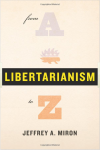The fact that the state is deeply imbedded in the production of security and identification makes clear thinking on these matters difficult.
Some people think that since the use of identification cards is ubiquitous in transactions of almost every stripe (rent a car, borrow a book, borrow money or get a credit card, sign a contract, drive a car, rent videos, etc.) that libertarians are just bonkers to insist that people have a right to withhold tendering ID to a police officer. So, let us draw distinctions that matter.
When you provide ID to a private party, you have a choice NOT to provide ID. Since those parties are subject to competition, they only require ID as a condition of doing business if it’s necessary. That’s why you have to provide ID to get credit, to rent something (unless you provide a deposit of money), or when paying by check; but, you don’t have to give ID when buying groceries, eating out at a restaurant, or going to the movies.
The state proclaims ownership over roads, and sets all policies on those roads. For this reason, it was the state that came to be the issuer of drivers’ licenses, which claim to serve as proof that the driver is competent to drive and that the driver has corrected or uncorrected vision of a certain standard. Since almost every adult in the US has a driver’s license, they have also come to be used by many private companies as definitive proof of identification, and are also used by police for the same purpose.
Technological advances in computing and printing have made counterfeiting of IDs less costly and more successful, especially in the last decade. It is well known that just about any 19 year-old college student can get a fake ID to drink.
When the state requires the presentation of identifying documents (or more broadly, an inquiry into the identification of someone), some purposes are legitimate, but most are illegitimate. This is because some of what the state does is legitimate, but most of what it does is illegitimate.
On the legitimate side of the register, it deploys police to patrol to prevent crime, respond to crimes, and nab the bad guys. In the course of nabbing a bad guy, they “book” him, which is a procedure of identification (taking fingerprints and pictures, finding out where he lives by asking for a driver’s license, etc.). Of course, private security can and does nab bad guys, too. They don’t typically do the “booking” of a bad guy because they are required by law to turn him over to the state.
On the illegitimate side of the register, the state enforces a number of malum prohibitum offenses. Among these are the supposed crime of living and/or working in a country without the state’s permission and possessing contraband. Both of these supposed crimes are difficult to enforce, since they are victimless crimes. Because of this, states have evolved low standards of detention and search of people, including the requirement to show ID to officers.
Nowhere is this farce more ludicrous than in the crackdown on security at airports since the September 11, 2001 attacks. IDs are now checked 2, 3, or 4 times in the course of checking in, entering a screening area, passing through a metal detector, and boarding a plane, all with a government-issued ID — either a driver’s license or a passport. Even people as young as me, now 39, can remember a time (before the TWA flight 800 disaster) when showing ID at an airport was not even done once. This hyper-scrutiny of ID documents assumes that the IDs shown are not fakes, which is not at all a credible assumption.
Likewise, with the recent passage of the unjust law Arizona SB 1070, I expect that the industry of producing fake IDs will boom. Who will benefit? Well, some good guys will benefit, being able to evade the state’s crackdown on the non-crime of illegal immigration. But the burgeoning industry will probably cause the cost of fake IDs to fall, giving lots of bad guys these benefits as well.
So, SB1070 will probably cause an increase in “identity theft” and other acts of fraud.



